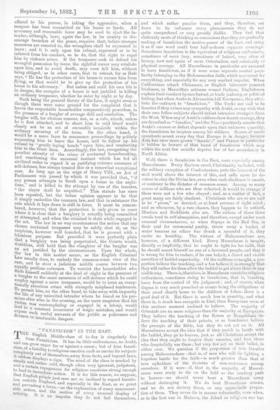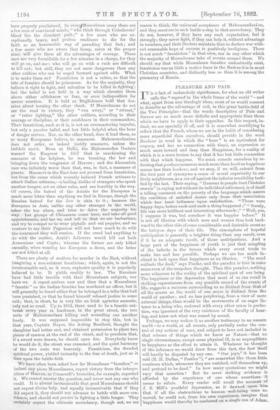"FANATICISM" IN THE EAST.
THE Englieh Middle-class of to-day is singularly free
from Fanaticism. It has its little enthusiasms, no doubt, and can grow eager for or against a cause ; but of true fanati- cism, of a liability to religious emotion such as carries its subjects completely out of themselves, away from facts, and beyond laws, it seldom displays a sign. The mind of the class is marked by steady and rather cold, though often very ignorant, judgment, and a certain repugnance for religious emotions strong enough to lead to immediate action. It is for this reason, we suppose, that English people just now are so inclined to regard fanatic- ism outside England, and especially in the East, as so great and pervading a force,—as the explanation of every unaccount- able action, and the motive of every unusual display of activity. It is an impulse they do not feel themselves,
and which rather puzzles them, and they, therefore, set down to its influence every phenomenon they do not quite comprehend or very greatly dislike. They find that slatternly mode of thinking so convenient that they are gradually making of fanaticism the motive-power of the East, and using it as if one word could. bear half-a-dozen separate meanings. Sometimes fanaticism is the equivalent of religious enthusiasm, sometimes of mere fury, sometimes of hatred, very often of lunacy, now and again of mere Orientalism, and constantly of physical courage. All Mussulmans in particular are assumed to have fanaticism, as if it were some separate mental pecu- liarity belonging to the Mahommedan faith, which accounted for everything, and especially for any very marked impulse. When Californians attack Chinamen, or English labourers pommel Irishmen, or Marseillais artisans wound Italians, Englishmen explain their conduct by race hatred, or trade jealousy, or political feeling; but when Arabs in Alexandria kill Europeans, they attri- bute the outburst to "fanaticism." The Turks are said to be fanatics if they evince any sympathy with Arabi, or any wish that their own fellow-subjects should defeat intrusive strangers from the West. When any of Arabi's soldiers show decent courage, they are described as " fanatics," and the Times positively asserts that Arabi's success or defeat depends upon that unknown quantity,
the fanaticism he inspires among his soldiers. Scores of corre- spondents assert every day that Europe is in danger, because Asia has once more grown " fanatic ;" and France in particular is bidden to beware of that burst of fanaticism which may within the next few months deprive her of her ascendancy in North Africa.
Well, there is fanaticism in the East, more especially among Mussulmans. Every Eastern creed, Christianity included, with the solitary exception of Confucianism, puts the interest of the next world above the interest of this, and calls upon its de- votees to obey the Divine law, even when such obedience is unsafe, or contrary to the dictates of common-sense. Among so many scores of millions who are thus exhorted, it would be strange if there were not a few who obeyed ; and, as a matter of fact, a groat many are fairly obedient. Christians who are so are said to be "pious," or devoted, or at least persons of right mind ; and so whenever, by a rare chance, they happen to be noticed, undoes and Buddhists also are. The virtues of those three creeds tend to self-abnegation, and therefore, except under most unusual circumstances, as when Sepoys in the Red Sea, in their zeal for ceremonial purity, throw away a bucket of water because an officer has drunk a spoonful of it, they excite no hostility. The virtues of Mahommedans are, however, of a different kind. Every Mussulmau is taught, directly or implicitly, that he ought to fight for his faith, that he should assert himself as one of a favoured people, and that it is wrong for him to endure, if Ins can help it, a direct and visible assertion of Infidel superiority. Of the millions so taught, a pro- portion believe the teaching, and a few believe it so strongly that they will rather die than allow the Infidel to get above them in any visible way. There is, therefore, in Mu ssulm an countries religions enthusiasm, sometimes rising to fanaticism, that is, breaking loose from the control of the judgment ; and, of course, when dogma is very much preached or events bring the obligations of their creed clearly home to the children of Islam, there is a good deal of it. But there is much less in quantity, and what there is, is much less energetic in kind, than Europeans seem at this anxious moment inclined to believe. The majority of Orientals are no more religious than the majority of Europeans. They believe the teaching of the Koran as Neapolitans be- lieve the teaching of their priests, or as Londoners believe the precepts of the Bible, but they do not act on it. All Mussulmans accept the idea that if they perish in battle with the Infidel, they go to heaven, just as all Christians accept the idea that they ought to forgive their enemies, and love those who despitefully use them ; but very few act on their belief, in either case. We question if the proportion of true fanatics among Mahommedans—that is, of men who will die fighting a hopeless battle for the faith—is much greater than that of true upholders of the doctrine of non-resistance among ourselves. If it were—if, that is, the majority of Mussul- mans were ready to die on the field as the readiest path to heaven—we should never beat a Mussulinan army without destroying it. We do beat Mussulman armies, and we do not destroy them, or any appreciable propor- tion of them. They never die in masses voluntarily, even when, as in the first war in Malacca, the Jehad or religious war has been properly proclaimed. In everypfussulman army there are a few men of convinced minds, " who think through Unbelievers' blood lies the directest path ;" a few more who are ex- ceptionally brave, and profess readiness to die for the faith as an honourable way of parading that fact ; and a few more who are aware that hemp, eaten at the proper time, will give them all the advantages of courage. These men are very formidable for a few minutes in a charge, for they will go on, and men who will go on with a rush are difficult to kill out; but still, they are not more dangerous than any other soldiers who can be urged forward against odds. What is to make them so p Fanaticism is not a rabies, so that the bite of fanatics should be poisonous. As for the majority, they believe it right to fight, and salvation to be killed in fighting ; but the belief is not held in a way which elevates them above either selfishness or fear, or even indisposition for severe exertion. It is held as Englishmen hold that doc- trine about turning the other cheek, If Mussulmans do not see the road to victory, they " run away," or " retreat," or " retire fighting," like other soldiers, according to their courage or discipline, or their confidence in their commanders. Their fanaticism, such as it is, is not an overmastering impulse, but only a passive belief, and but little helpful when the hour of danger arrives. Nor, on the other hand, does it lead them, as so many Europeans believe, to massacre. Mahommedanism does not order, or indeed justify massacre, unless the Infidels resist. Even at Delhi, the Mahommedan Doctors warned the Emperor in 1857 that in sanctioning the massacre of the helpless, he was breaking the law and bringing down the vengeance of Heaven ; and the Alexandria case was infinitely worse than that, was, in fact, a massacre of guests. Massacre in the East does not proceed from fanaticism, but from the cause which recently induced French artisans to attack Italian artisans,—a boiling dislike of strangers who speak another tongue, act on other rules, and are horribly in the way. Of course, the hatred of the Asiatic for the European is much more bitter than anything we find in Europe, though the Russian hatred for the Jew is akin to it ; because the European in Asia, unlike any other stranger in the world, takes the top place, and tries to drive the majority his way. Let groups of Chinamen come here, and take all good appointments, and tax us, and tell us that we are barbarians, and try to compel us to wear pigtails and eat puppies, and we venture to say their Paganism will not have much to do with the treatment they will receive. If the creed had anything to do with the matter, Arabi's followers would kill out both Armenians and Copts ; whereas the former are only killed casually, when wearing too European a dress, and the latter are not killed at all.
There are plenty of motives for murder in the East, without imagining a non-existent fanaticism ; which, again, is not the irrestrainable and, as it were, explosive quality it is popularly believed to be. It yields readily to law. The Russians have had little trouble with their Mussulman subjects, nor have we. A report arrives now and then that a Mussulman " fanatic " on the Indian frontier has murdered an officer, but it will generally be found either that be belonged to a tribe that had been punished, or that he found himself refused justice in some suit; that, in short, he is very like an Irish agrarian assassin, only not so cruel. Up to 1852, there used to be a fanatic out- break every year in Lucknow, in the great street, the two sects of Mahommedans killing and wounding one another freely. It was supposed impossible to stop this, but in that year, Captain Hayes, the Acting Resident, thought the slaughter had better end, and obtained permission to plant two pieces of cannon at the end of the street, and to proclaim that, if a sword were drawn, he should open fire. Everybody knew he would do it, the street was crammed, and the quiet harmony of the two sects was heavenly. Fanaticism, the dreaded spiritual power, yielded instantly to the fear of death, just as it does upon the battle-field.
We have often been asked how far Mussulman " fanatics," or indeed any pious Mussulmans, expect victory from the interpo- sition of Heaven, as Cromwell's Ironsides, for example, expected it. We cannot answer the question, and never met any one who could. It is almost inconceivable that good Mussulmans should not expect divine help, and equally inconceivable that if they did expect it, they should not advance to battle with more con. fidence, and should not persist in fighting a little longer. They certainly expect the ultimate ascendancy, though not, we see reason to think, the universal acceptance of Mahommedanism, and they must see in each battle a step to that ascendancy. They do not, however, if they have any such expectation, feel it strongly; they never fight, if they can help it, without advantage in numbers, and their Doctors maintain that to declare war with- out reasonable hope of success is positively irreligious. There is not much " fanaticism " in that view, nor in any other which the majority of Mussulmans take of events around them. We should say that while Mussulman fanatics undoubtedly exist, fanaticism was as little a motive force in the East as it is in most Christian countries, and distinctly less so than it is among the peasantry of Russia.































 Previous page
Previous page